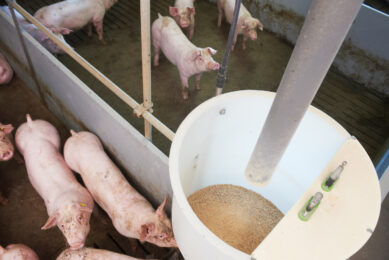Research: Dehulled lupins in weaner pig diets
Combined Australian/Canadian research studied the performance and intestinal responses to dehulling and inclusion level of Australian sweet lupins (Lupinus angustifolius L.) in diets for weaner pigs.
A total of 180 entire male weaner pigs weighing 6.4 ± 0.1 kg and housed in pairs was used in a completely randomised block design with 9 dietary treatments (n = 10 pens). Pigs were blocked based on weaning weight.
The diets were (i) a wheat-based control diet containing 240 g/kg of milk products (whey and skim milk powder), and (ii) 8 diets containing whole or dehulled lupins (cv. Coromup) that substituted the milk products at 60, 120, 180 and 240 g/kg of diet (replace 25%, 50%, 75%, or 100% of the milk products in the control diets).
The diets were isoenergetic [15 MJ digestible energy (DE)/kg], and were formulated to contain the same ileal standardised digestible lysine content (0.85 g/MJ DE) and ideal patterns of other essential amino acids.
Results
Pigs receiving 240 g/kg of dehulled lupins grew slower than pigs fed the other diets mainly due to decreased feed intake.
Pigs receiving 240 g/kg of dehulled lupins grew slower than pigs fed the other diets mainly due to decreased feed intake.
Pigs fed diets containing more than 180 g/kg of dehulled lupins had a higher faecal β-haemolytic Escherichia coli score on day 3 after weaning.
Moreover, inclusion of 240 g/kg of whole lupin or more than 180 g/kg of dehulled lupins increased plasma urea nitrogen (PUN) levels.
Total tract apparent digestibility (TTAD) of dry matter decreased in all lupin diets compared with the control diet.
Conclusion
These data indicate that inclusion of dehulled lupin immediately after weaning should be limited to less than 180 g/kg whilst whole lupins can be included up to 240 g/kg without deleterious effects on production and intestinal health.
These data indicate that inclusion of dehulled lupin immediately after weaning should be limited to less than 180 g/kg whilst whole lupins can be included up to 240 g/kg without deleterious effects on production and intestinal health.











